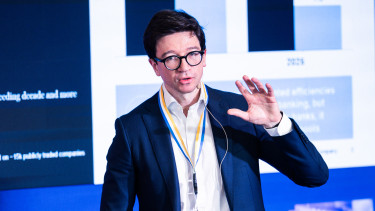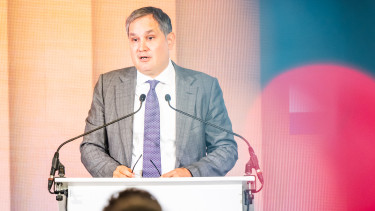Electric and self-driving cars will revolutionise the automotive sector - Traffic with zero accidents, emissions and congestion ahead

In what areas is Land Rover already using artificial intelligence?
Jaguar Land Rover uses artificial intelligence at many different stages of the vehicle development process. One of the most interesting current examples is a research project developing new artificial intelligence technology to understand changes in the driver’s mood and adapt a number of cabin features, including the heating, air conditioning, ventilation, media and ambient lighting, to help tackle stress.
The mood-detection system will use the latest AI techniques to continually adapt to nuances in the driver’s facial expressions and implement appropriate settings automatically. In time it will learn a driver’s preference and make increasingly tailored adjustments.
We are also trialling similar technology for rear passengers, with a camera mounted in the headrest. If the system detects signs of tiredness, it could dim the lights, tint the windows or raise the temperature in the back, to help an occupant get to sleep.
In the future, robots may play an even bigger role in logistics and manufacturing. In your opinion, will there be a time when they completely replace humans at production lines?
Intelligent industrial automation is evolving quickly as manufacturers move towards more smart, connected factories. At Jaguar Land Rover automation has a critical role to play, particularly in processes where safety, fine dimensional tolerances, space and flexibility are key.
However, the role of the production associate in our business is paramount, particularly when dealing with the complex range of derivatives and high levels of personalisation expected from our premium brands.
In your view, what job in the car industry will be most affected by the spread of artificial intelligence?
It’s too soon to say, we know that artificial intelligence has an important role to play in the development and testing of future autonomous driving feature, which may influence many roles to some extent.
What type of skills will future car industry engineers require in order to be competitive in the global labour market?
In Hungary, we are looking for engineers to develop electronic hardware and mechatronics at our technical engineering centre.
Our engineers in Budapest work closely with our R&D, engineering and manufacturing functions headquartered in the UK as well as working alongside our supply chain located in Europe to support the launch of vehicles into our global manufacturing locations, such as Slovakia.
As well as engineering skills, we are looking for people who are naturally curious, creative and collaborative. We want our team in Hungary to always challenge themselves, their environment and never accept no as an answer. This ensures that we continuously improve our skills, processes and deliver operational efficiencies.
Can the fight against the coronavirus accelerate the use of Industry 4.0 achievements (robotisation, automation and digitalisation) in the future?
We are all living in unprecedented times during which all of our lives are likely to fundamentally change as a result of the global coronavirus pandemic and, perhaps, it is too early to say exactly how this will be in the future.
However, it is likely that robotization, automation and digitalisation may have an increasing role to play in the development of future vehicles.
In your opinion, will the challenges presented by the coronavirus speed up or slow down the e-mobility revolution?
Mobility is a basic human need and people will want safe, clean as well as secure ways of moving about.
It is likely that we will see changes to the way in which we all travel and initially, people are unlikely to want to use shared services or public transport. We could see an increase in individual mobility. With a personal car, you have peace of mind that it is clean and safe as well as the flexibility to undertake your routine journeys, when it is allowed again. Perhaps owning a car will be more desirable.
The drive towards electrification could be impacted in a number of ways as a result of the Covid-19 pandemic. For example, lower diesel prices could make the latest petrol and diesel engines a more compelling option for some. Alternatively, electrified vehicles could be incentivised further as we have seen reduced emissions during the lockdown period.
At Jaguar Land Rover, through our Destination Zero mission, we are already driving towards our ambition of zero emissions, zero accidents and zero congestion.
In your opinion, will the challenges presented by the coronavirus speed up or slow down the e-mobility revolution?
Mobility is a basic human need and people will want safe, clean as well as secure ways of moving about.
It is likely that we will see changes to the way in which we all travel and initially, people are unlikely to want to use shared services or public transport. We could see an increase in individual mobility. With a personal car, you have peace of mind that it is clean and safe as well as the flexibility to undertake your routine journeys, when it is allowed again. Perhaps owning a car will be more desirable.
The drive towards electrification could be impacted in a number of ways as a result of the Covid-19 pandemic. For example, lower diesel prices could make the latest petrol and diesel engines a more compelling option for some. Alternatively, electrified vehicles could be incentivised further as we have seen reduced emissions during the lockdown period.
At Jaguar Land Rover, through our Destination Zero mission, we are already driving towards our ambition of zero emissions, zero accidents and zero congestion.
Who could be the biggest winners and losers of this?
It is too soon to say as we are still experiencing the unprecedented circumstances created by the global coronavirus pandemic.
Artificial intelligence could play a major role not just in manufacturing but also in providing mobility. The goal is to make fully autonomous vehicles; when could this be realistic?
Today’s research is tomorrow’s reality. The world of mobility will see more change in the next ten years than the last century.
Autonomous, connected, electric and shared mobility services will transform society.
What do you think about Tesla chief Elon Musk’s statement that self-driving technology to take vehicles from point A to point B without human input could become available as early as this year?
There are many different factors to be considered when looking at self-driving technologies, including, this is dependent on the distance, the type of road and the environment.
When could Jaguar Land Rover enter the market with its first fully autonomous vehicle?
Again, today’s research is tomorrow’s reality. The world of mobility will see more change in the next ten years than the last century.
At Jaguar Land Rover, the answer to this change and our defined vision to shape future mobility is Destination Zero: zero accidents, zero emissions and zero congestion.
Our ambition is to make our societies safer and healthier, and our environment cleaner.
Jaguar Land Rover is a leading premium mobility player, dedicated to creating experiences people love, for life.
The greatest progress in semi- and fully autonomous driving is improved safety.
At Jaguar Land Rover, we believe that any self-driving vehicle will only enhance the drivers’ experience, not replace it.
Automated features will assist customers in making the transition to a fully intelligent vehicle.
Like our current cars, our future self-driving vehicles will be the most capable in the widest range of terrain and weather conditions. We are creating the benchmark for premium self-driving comfort and capability.
There is huge competition, and not just with other car makers but also with technology giants and with startups virtually unknown today. Do you see any players in the market, incumbent or emerging, who are way ahead of the field in autonomous mobility based on artificial intelligence?
Self-driving is a mobility revolution. Collaboration with academia, industry and government is helping accelerate our innovation to realise self-driving for our customers.
In your view, what technology or technologies could bring about a breakthrough in autonomous mobility?
One of the challenges faced is predicting the unpredictable, such as the movements of other traffic participants along with a high level of recognition for people’s actions during the night or in extreme fog.
Will the number of road accidents really decline dramatically thanks to self-driving cars using AI?
At Jaguar Land Rover, the answer to this change and our defined vision to shape future mobility is Destination Zero: zero accidents, zero emissions and zero congestion.
The greatest progress in semi- and fully autonomous driving is improved safety.
It is widely recognised that human factors, such as lack of concentration and fatigue, contribute to many accidents and autonomous technologies could result in fewer accidents.
There will always be unexpected events. How can robot drivers be prepared to make the best decision when human lives are on the line?
Safety is a primary concern for everyone involved with the development of future technologies.
We believe that the greatest progress in semi- and fully autonomous driving is improved safety. Self-driving will create choice. It will fill the gap between a driver’s own personal driving ability and the full capability of the vehicle. The customer will always be in command with the option to resume control.
Cover photo by: Mark Kauzlarich/Bloomberg via Getty Images













